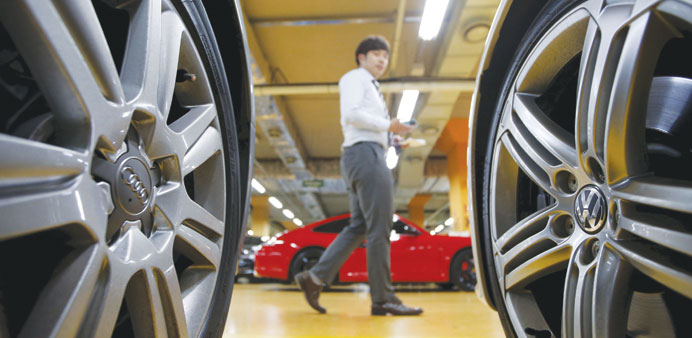Logos of Volkswagen (right) and Audi are seen on the wheels of cars at a used car dealership in Seoul. The German carmaker sold 2,901 cars last month, data from the Korea Automobile Importers & Distributors Association showed yesterday.
Reuters
Seoul
German carmaker Volkswagen, rocked by a diesel emissions scandal that erupted on September 18, saw its sales in South Korea slide 7.8% in September from a month earlier, according to industry data released yesterday.
As sales slipped globally after an emissions-cheating cover-up came to light, the world’s biggest carmaker by sales cited a “limited impact” in South Korea from the scandal. It sold 2,901 cars last month, data from the Korea Automobile Importers & Distributors Association showed.
However, Volkswagen’s Audi brand recorded a 22% sales jump from August as foreign car sales grew 12% in September from a month earlier. Overall auto sales rose 7.2% in September from August, according to South Korea’s trade ministry.
In a market where about nine-tenths of its sales are diesel vehicles, Volkswagen’s September showing was its weakest since May.
In recent years German carmakers have made significant inroads in South Korea, long dominated by Hyundai Motor, boosted by their brand cachet and the growing popularity of diesel engines, which outsold petrol engines for the first time in 2013.
A spokesman for Volkswagen Korea, declining to be named, said that in addition to the limited hit from the scandal, sales dropped last month because August was boosted by promotions, and a three-day holiday meant fewer selling days in September.
The data showed Volkswagen’s sales last month rose 26.7% from the same month a year earlier. Sales of foreign-branded cars increased 19.7% from the previous September, the four biggest import brands being German with diesel engines accounting for the bulk of their sales.
In South Korea, 92,247 Volkswagen diesel vehicles and 28,791 cars sold by Audi between 2009 and 2015 were installed with emissions-cheating software, according to the government. They will be recalled following an investigation by the environment ministry due to end in November.

